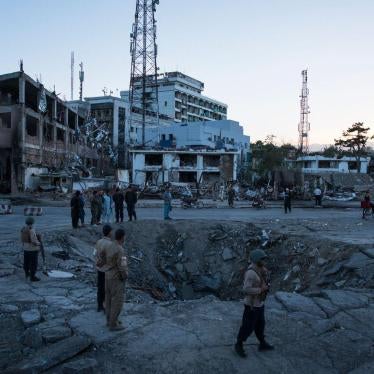(Washington) -- Nearly half of the antipersonnel mines retained by the United States for use in Korea are actually stored in the United States, Human Rights Watch revealed today. The need to keep these antipersonnel mines to defend South Korea is regularly cited by U.S. officials as a key reason for the U.S. not joining the 1997 Mine Ban Treaty.
According to information obtained by Human Rights Watch from the U.S. Army Material Command in a Freedom of Information Act request, 45 percent of the 1.2 million long-lasting "dumb" (non-self-destructing) antipersonnel mines retained for use in Korea are stored at depots in the continental U.S. Another 50 percent are in Korea, but at the onset of conflict will be handed over to South Korean troops for their use. The U.S. earmarks only the remaining 5 percent of the mines for immediate use by U.S. troops in South Korea.
"This new information seriously calls into question the major rationale put forth by the Pentagon for not banning antipersonnel mines," said Steve Goose, program director of Human Rights Watch's arms division. "The U.S. has repeatedly said that these mines are needed to stop a massive surprise attack by North Korea. Obviously, they are not needed for that if they are sitting in warehouses in the U.S."
Today, December 3, 2001, is the fourth anniversary of the opening for signature of the Mine Ban Treaty, which prohibits all use, production, stockpiling and trade of antipersonnel mines. The treaty has been signed by 142 nations, including every other member of NATO except Turkey, which announced earlier this year it would join in the near future.
"The Bush administration needs to be fully informed about the mines retained for use in Korea," said Mr. Goose. "Most people assume that the mines for use in Korea are already there, not weeks or months away."
There are already more than one million mines buried in the ground in and near the Demilitarized Zone separating North and South Korea. These mines are under South Korean control, not U.S. The 1.2 million stockpiled U.S. M16 and M14 antipersonnel mines are additional mines intended for use in case of renewed conflict.
A U.S. law in place since 1992 prohibits exports or transfers of antipersonnel mines to any country. It is therefore not clear what legal mechanisms would allow the transfer of the approximately 600,000 mines held as War Reserve Stocks for Allies (WRSA) to the South Koreans. The Clinton administration announced in January 1997 that as a matter of policy the U.S. would observe a permanent ban on the export and transfer of antipersonnel mines.
Human Rights Watch recently reported that the Pentagon has recommended that the Bush administration abandon the U.S. commitment to ban antipersonnel mines as soon as possible and in particular the target date for joining the Mine Ban Treaty in 2006. The Bush administration is in the midst of a review of U.S. landmine policy.





